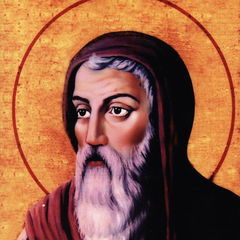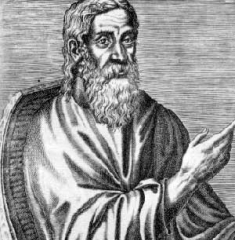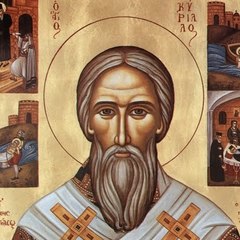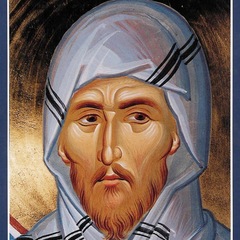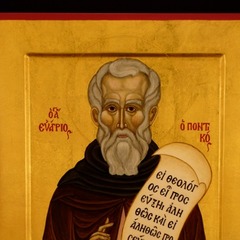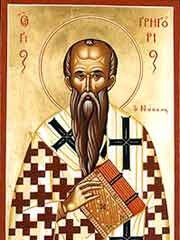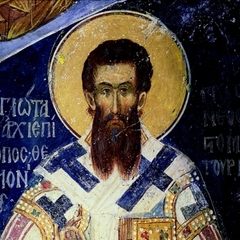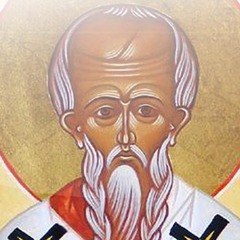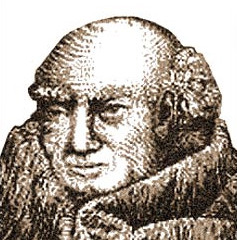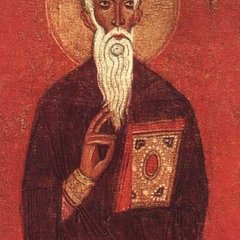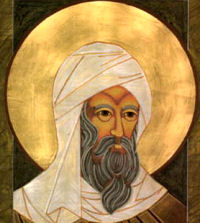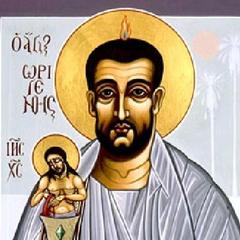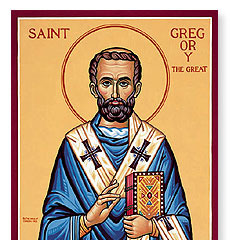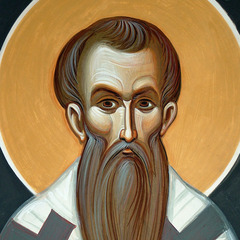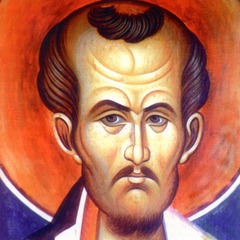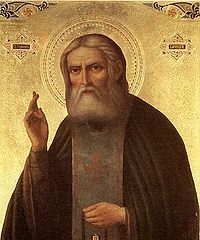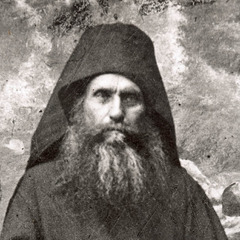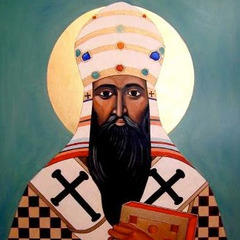Maximus the Confessor quotes
-
“To harbor no envy, no anger, no resentment against an offender is still not to have charity for him. It is possible, without any charity, to avoid rendering evil for evil. But to render, spontaneously, good for evil - such belongs to a perfect spiritual love.”
-- Maximus the Confessor -
“When a man's intellect is constantly with God, his desire grows beyond all measure into an intense longing for God and his incensiveness is completely transformed into divine love. For by continual participation in the divine radiance his intellect becomes totally filled with light; and when it has reintegrated its passible aspect, it redirects this aspect towards God, filling it with an incomprehensible and intense longing for Him and with unceasing love, thus drawing it entirely away from worldly things to the divine.”
-- Maximus the Confessor -
“The person who loves God cannot help loving every man as himself, even though he is grieved by the passions of those who are not yet purified. But when they amend their lives, his delight is indescribable and knows no bounds.”
-- Maximus the Confessor -
“For him who is perfect in love and has reached the summit of dispassion there is no difference between his own or another's, or between Christians and unbelievers, or between slave and free, or between male and female. But because he has risen above the tyranny of the passions and has fixed his attention on the single nature of man, he looks on all in the same way and shows the same disposition to all. For in him there is neither Greek nor Jew, male nor female, bond not free, but Christ who 'is all, and in all' (Col. 3:11; cf. Gal. 3:28).”
-- Maximus the Confessor -
-
“He who has not yet attained divine knowledge energized by love is proud of his spiritual progress. But he who has been granted such knowledge repeats with deep conviction the words uttered by the patriarch Abraham when he was granted the manifestation of God: 'I am dust and ashes' (Gen. 18:27).”
-- Maximus the Confessor -
“Before His visible advent in the flesh the Logos of God dwelt among the patriarchs and prophets in a spiritual manner, prefiguring the mysteries of His advent. After His incarnation He is present in a similar way not only to those who are still beginners, nourishing them spiritually and leading them toward the maturity of divine perfection, but also to the perfect, secretly pre-delineating in them the features of His future advent as if in an ikon.”
-- Maximus the Confessor -
“You will be able to check envy if you rejoice with the man whom you envy whenever he rejoices, and grieve whenever he grieves.”
-- Maximus the Confessor -
“Blessed is he who like Joshua (cf. Josh. 10:12-13) keeps the Sun of righteousness from setting in himself throughout the whole day of his present life, not allowing it to be blotted out by the dusk of sin and ignorance. In this way he will truly be able to put to flight the cunning demons that rise up against him.”
-- Maximus the Confessor -
-
“He who devoutly strives to attain wisdom and is on his guard against the invisible powers, should pray that both natural discrimination - whose light is but limited - and the illuminating grace of the Spirit abide in him. The first by means of practice trains the flesh in virtue, the second illuminates the intellect so that it chooses above all else companionship with wisdom; and through wisdom it destroys the strongholds of evil and pulls down 'all the self-esteem that exalts itself against the knowledge of God' (II Cor. 10:5).”
-- Maximus the Confessor -
“Those who seek the Lord should not look for Him outside themselves; on the contrary, they must seek Him within themselves through faith made manifest in action. For He is near you: 'The word is... in your mouth and in your heart, that is, the word of faith' (Rom. 10:8) - Christ being Himself the word that is sought.”
-- Maximus the Confessor -
“As long as I remain imperfect and refractory, neither obeying God by practising the commandments nor becoming perfect in spiritual knowledge, Christ from my point of view also appears imperfect and refractory because of me. For I diminish and cripple Him by not growing in spirit with Him, since I am 'the body of Christ and one of its members' (I Cor. 12:27).”
-- Maximus the Confessor -
“Peace is truly the complete and undisturbed possession of what is desired.”
-- Maximus the Confessor -
-
“Just as the light of the sun attracts a healthy eye, so through love knowledge of God naturally draws to itself a pure intellect.”
-- Maximus the Confessor -
“If the words of God are uttered merely as verbal expressions, and their message is not rooted in the virtuous way of life of those who utter them, they will not be heard. But if they are uttered through the practice of the commandments, their sound has such power that they dissolve the demons and dispose men eagerly to build their hearts into temples of God through making progress in works of righteousness.”
-- Maximus the Confessor -
“No benefit comes from a just man's prayer if he who asks for it finds more pleasure in sin than in virtue. For Samuel mourned over Saul when he sinned, but he was not able to obtain God's mercy, for his grief was not supported by the necessary change of life on the part of the sinner. Hence God put an end to the pointless grief of His servant, saying to him, 'How long will you mourn for Saul, seeing I have rejected him from reigning over Israel?' (I Sam. 16:1).”
-- Maximus the Confessor -
“... for our sake loosing within Himself the bonds of bodily birth, He granted us through spiritual birth, according to our own volition, power to become children of God instead of children of flesh and blood if we have faith in His Name (cf. Jn. 1:12-13). For the Savior the sequence was, first of all, incarnation and bodily birth for my sake; and so thereupon the birth in the Spirit through baptism, originally spurned by Adam, for the sake of my salvation and restoration by grace, or, to describe it even more vividly, my very remaking.”
-- Maximus the Confessor -
-
“He who through virtue and spiritual knowledge has brought his body into harmony with his soul has become a harp, a flute and a temple of God. He has become a harp by preserving the harmony of the virtues; a flute by receiving the inspiration of the Spirit through divine contemplation; and a temple by becoming a dwelling place of the Logos through the purity of his intellect.”
-- Maximus the Confessor -
“If we keep the path of virtue undefiled through devout and true knowledge, and do not deviate to either side, we will experience the advent of God revealed to us because of our dispassion. For 'I will sing a psalm and in a pure path I will understand when Thou wilt come to me' (cf. Ps. 101:1-2). The psalm stands for virtuous conduct; understanding indicates the spiritual knowledge, gained through virtue, by means of which we perceive God's advent, when we wait for the Lord vigilant in the virtues.”
-- Maximus the Confessor -
“We must not only put bodily passions to death but also destroy the soul's impassioned thoughts. Hence the Psalmist says, 'Early in the morning I destroyed all the wicked of the earth, that I might cut off all evil-doers from the city of the Lord' (Ps. 101:8) - that is, the passions of the body and the soul's godless thoughts.”
-- Maximus the Confessor -
“...the Lord said as He drew near His passion, 'Now is the Son of man glorified, and God is glorified in Him. If God is glorified in Him, God will also glorify Him in Himself; and He will glorify Him at once' (Jn. 13:31-32). From This it is clear that divine gifts follow sufferings endured for the sake of virtue.”
-- Maximus the Confessor -
-
“When our intellect has shaken off its many opinions about created things, then the inner principle of truth appears clearly to it, providing it with a foundation of real knowledge and removing its former preconceptions as though removing scales from eyes, as happened in the case of St. Paul (cf. Acts 9:18). For an understanding of Scripture that does not go beyond the literal meaning, and a view of the sensible world that relies exclusively on sense perception, are indeed scales, blinding the soul's visionary faculty and preventing access to the pure Logos of truth.”
-- Maximus the Confessor -
“The man who has struggled bravely with the passions of the body, has fought ably against unclean spirits, and has expelled from his soul the conceptual images they provoke, should pray for a pure heart to be given him and for a spirit of integrity to be renewed within him (cf. Ps. 51:10). In other words, he should pray that by grace he may be completely emptied of evil thoughts and filled with divine thoughts, so that he may become a spiritual world of God, splendid and vast, wrought from moral, natural and theological forms of contemplation.”
-- Maximus the Confessor -
“A pure heart is perhaps one which has no natural propulsion towards anything in any manner whatsoever. When in its extreme simplicity such a heart has become like a writing-tablet beautifully smoothed and polished, God comes to dwell in it and writes there His own laws.”
-- Maximus the Confessor -
“He who is a beginner on the way must not be brought to practise the commandments by kindness alone, but must more often be induced to continue the struggle by being rigorously reminded of God's judgment. In this way he will not only be moved by love to desire what is divine, but will be moved by fear to avoid what is evil. For 'I will sing to Thee, O Lord, of mercy and judgment' (Ps. 101:1 LXX). He will sing to God charmed by love, and steeled by fear he will have strength for the song.”
-- Maximus the Confessor -
-
“The Logos came down out of love for us. Let us not keep Him down permanently, but let us go up with Him to the Father, leaving the earth and earthly things behind, lest He say to us what He said to the Jews because of their stubbornness: 'I go where you cannot come (Jn. 8:21).”
-- Maximus the Confessor -
“In all our actions, God considers the intention: whether we act for Him or for some other motive.”
-- Maximus the Confessor -
“...the aim of every hierarchy is always to imitate God so as to take on His form... the task of every hierarchy is to receive and to pass on undiluted purification, the divine light, and the understanding which brings perfection.”
-- Maximus the Confessor -
“The person who loves God cannot help loving every man as himself, even though he is grieved by the passions of those who are not yet purified. But when they amend their lives, his delight is indescribable and knows no bounds. A soul filled with thoughts of sensual desire and hatred is unpurified. If we detect any trace of hatred in our hearts against any man whatsoever for committing any fault, we are utterly estranged from love for God, since love for God absolutely precludes us from hating any man.”
-- Maximus the Confessor -
-
“Created man cannot become a son of God and god by grace through deification, unless he is first through his own free choice begotten in the Spirit by means of the self-loving and independent power dwelling naturally in him.”
-- Maximus the Confessor -
“If the divine Logos of God the Father became son of man and man so that He might make men gods and the sons of God, let us believe that we shall reach the realm where Christ Himself now is; for He is the head of the whole body (cf. Col. 1:18), and endued with our humanity has gone to the Father as forerunner on our behalf. God will stand 'in the midst of the congregation of gods' (Ps. 82:1 LXX) - that is, of those who are saved - distributing the rewards of that realm's blessedness to those found worthy to receive them, not separated from them by any space.”
-- Maximus the Confessor -
“Just as the teaching of the Law and the prophets, being harbingers of the coming advent of the Logos in the flesh, guide our souls to Christ (cf. Gal. 3:24), so the glorified incarnate Logos of God is Himself a harbinger of His spiritual advent, leading our souls forward by His own teachings to receive His divine and manifest advent. He does this ceaselessly, by means of the virtues converting those found worthy from the flesh to the spirit. And He will do it at the end of the age, making manifest what has hitherto been hidden from men.”
-- Maximus the Confessor -
“Those who, animal-like, live solely according to the senses... misuse God's creation in order to indulge the passions. They do not understand the principle of that wisdom which is revealed to all: that we should know and praise God through His creation and that by means of the visible world we should understand whence we came, what we are, for what purpose we were made and where we are going. On the contrary, they travel through this present age in darkness... with... ignorance of God.”
-- Maximus the Confessor -
-
“When we think of the height of God's infinity we should not despair of His compassion reaching us from such a height; and when we recall the infinite depth of our fall through sin we should not refuse to believe that the virtue which has been killed in us will rise again. For God can accomplish both these things: He can come down and illumine our intellect with spiritual knowledge, and He can raise up the virtue within us and exalt it with Himself through works of righteousness.”
-- Maximus the Confessor -
“If you expound the teaching of the Logos from the standpoint of the moral life, using materialistic words and examples which correspond to the capacity of your hearers, you make the Logos flesh. Conversely, if you elucidate mystical theology by means of the higher forms of contemplation you make the Logos spirit.”
-- Maximus the Confessor -
“When like the patriarchs we learn to dig wells of virtue and spiritual knowledge within ourselves by means of ascetic practice and contemplation, we will find within us Christ the spring of life (cf. Gen. 26:15-18). Wisdom commands us to drink from this spring, saying, 'Drink water from your own pitchers and from the spring of your own wells' (Prov. 5:15). If we do this we shall find that the treasures of wisdom truly are within us.”
-- Maximus the Confessor -
“...one's movement towards the divine reaches its end only when one reaches God... 'The true Sabbaths are the rest laid up for the people of God' (Heb. 4:9). God can 'bear these sabbaths' (cf. Is. 1:13) because they are true. And the one 'in which the world is crucified' (Gal. 6:14) reaches these sabbaths of rest because he has clearly turned away from worldly things and returned to his own spiritual resting place. The one who arrives there will no longer be moved from his place, for there he finds quiet and tranquility.”
-- Maximus the Confessor -
-
“By His gracious condescension God became man and is called man for the sake of man and by exchanging His condition for ours revealed the power that elevates man to God through his love for God and brings God down to man because of His love for man. By this blessed inversion, man is made God by divinization and God is made man by hominization. For the Word of God and God wills always and in all things to accomplish the mystery of His embodiment.”
-- Maximus the Confessor -
“Our forefather Adam... used his freedom to turn toward what was worse and to direct his desire away from what had been permitted to what was forbidden. It was in his power 'to be united to the Lord and become one spirit with God...' (I Cor. 6:15). But Adam was deceived and chose to cut himself off voluntarily from God's happy end for him, preferring by his own free choice to be drawn down to the earth (cf. Gen. 2:17) than to become God by grace.”
-- Maximus the Confessor -
“He who has realized love for God in his heart is tireless in his pursuit of the Lord his God, and bears every hardship, reproach and insult nobly, never thinking the least evil of anyone.”
-- Maximus the Confessor -
“When you are insulted by someone or humiliated, guard against angry thoughts, lest they arouse a feeling of irritation, and so cut you off from love and place you in the realm of hatred. You should know that you have been greatly benefited when you have suffered deeply because of some insult or indignity; for by means of the indignity self-esteem has been driven out of you.”
-- Maximus the Confessor -
-
“He who asks to receive his daily bread does not automatically receive it in its fullness as it is in itself: he receives it according to his own capacity as recipient. The Bread of Life (cf. Jn. 6:35) gives Himself in His love to all who ask, but not in the same way to all; for He gives Himself more fully to those who have performed great acts of righteousness, and in smaller measure to those who have not achieved so much. He gives Himself to each person according to that person's spiritual ability to receive Him.”
-- Maximus the Confessor -
“Let us be satisfied simply with what sustains our present life, not with what pampers it. Let us pray to God for this, as we have been taught, so that we may keep our souls unenslaved and absolutely free from domination by any of the visible things loved for the sake of the body. Let us show that we eat for the sake of living, and not be guilty of living for the sake of eating. The first is a sign of intelligence, the second proof of its absence.”
-- Maximus the Confessor -
“Just as the thought of fire does not warm the body, so faith without love does not actualize the light of spiritual knowledge in the soul.”
-- Maximus the Confessor -
“He who busies himself with the sins of others, or judges his brother on suspicion, has not yet even begun to repent or to examine himself so as to discover his own sins...”
-- Maximus the Confessor -
-
“Whatever a man loves he inevitably clings to, and in order not to lose it he rejects everything that keeps him from it. So he who loves God cultivates pure prayer, driving out every passion that keeps him from it. He who drives out self-love, the mother of the passions, will with God's help easily rid himself of the rest, such as anger, irritation, rancor and so on. But he who is dominated by self-love is overpowered by the other passions, even against his will. Self-love is the passion of attachment to the body.”
-- Maximus the Confessor -
“But I say to you, the Lord says, love your enemies, do good to those who hate you, pray for those who persecute you. Why did he command these things? So that he might free you from hatred, sadness, anger and grudges, and might grant you the greatest possession of all, perfect love, which is impossible to possess except by the one who loves all equally in imitation of God.”
-- Maximus the Confessor -
“God, Who is by nature good and dispassionate, loves all men equally as His handiwork. But He glorifies the virtuous man because in his will he is united to God. At the same time, in His goodness he is merciful to the sinner and by chastising him in this life brings him back to the path of virtue. Similarly, a man of good and dispassionate judgment also loves all men equally. He loves the virtuous man because of his nature and the probity of his intention; and he loves the sinner, too, because of his nature and because in his compassion he pities him for foolishly stumbling in darkness.”
-- Maximus the Confessor -
“Theology without practice is the theology of demons”
-- Maximus the Confessor -
-
“Every genuine confession humbles the soul. When it takes the form of thanksgiving, it teaches the soul that it has been delivered by the grace of God.”
-- Maximus the Confessor -
“If you make provision for the desires of the flesh and bear a grudge against your neighbor on account of something transitory, you worship the creature instead of the Creator.”
-- Maximus the Confessor -
“If everything that exists was made by God and for God, and God is superior to the things made by Him, he who abandons what is superior and devotes Himself to what is inferior shows that he values things made by God more than God Himself.”
-- Maximus the Confessor -
“'The long-suffering man abounds in understanding' (Prov. 14:29), because he endures everything to the end and, while awaiting that end, patiently bears his distress. The end, as St. Paul says, is everlasting life (cf. Rom. 6:22). 'And this is eternal life, that they might know You the only true God, and Jesus Christ whom You have sent' (Jn. 17:3).”
-- Maximus the Confessor -
-
“Without the power of intelligence there is no capacity for spiritual knowledge; and without spiritual knowledge we cannot have the faith from which springs that hope whereby we grasp things of the future as though they were present. Without the power of desire there is no longing, and so no love, which is the issue of longing; for the property of desire is to love something. And without the incensive power, intensifying the desire for union with what is loved, there can be no peace, for peace is truly the complete and undisturbed possession of what is desired.”
-- Maximus the Confessor -
“The patient endurance of the saints exhausts the evil power that attacks them, since it makes them glory in sufferings undergone for the sake of the truth. It teaches those too much concerned with a life in the flesh to deepen themselves through such sufferings instead of pursuing ease and comfort; and it makes the flesh's natural weakness in the endurance of suffering a foundation for overwhelming spiritual power. For the natural weakness of the saints is precisely such a foundation, since the Lord has made their weakness stronger than the proud devil.”
-- Maximus the Confessor -
“When what has been created in time according to the temporal order has reached maturity, it ceases from natural growth. But when what has been brought about by the knowledge of God through the practice of the virtues has reached maturity, it starts to grow anew. For the end of one stage constitutes the starting point of the next.”
-- Maximus the Confessor -
“There is a single energy of God and the saints? they are living icons of Christ, being the same as He is, by grace rather than by assimilation.”
-- Maximus the Confessor -
-
“If... Adam had trusted in God and been nourished from the tree of life (Gn. 2:9)? he would not have set aside the immortality that had been granted. For such immortality is eternally preserved by participation in life, since all life is genuine and preserved by appropriate food. The food of that blessed life is 'the bread that came down from heaven and gives life to the world' (Jn. 6:33), just as the inerrant Word Himself declares about Himself in the Gospels.”
-- Maximus the Confessor -
“Dispassion and humility lead to spiritual knowledge. Without them no one will see the Lord.”
-- Maximus the Confessor -
“If God suffers in the flesh when He is made man, should we not rejoice when we suffer, for we have God to share our sufferings? This shared suffering confers the kingdom on us. For he spoke truly who said, 'If we suffer with Him, then we shall also be glorified with Him' (Rom. 8:17).”
-- Maximus the Confessor -
“He has as yet no perfect love, whose disposition towards men depends on what they are like, loving one and despising another for this or that, or sometimes loving, sometimes hating one and the same man. Blessed is the man who can love all men equally.”
-- Maximus the Confessor -
-
“Many have said much about love, but you will find love itself only if you seek it among the disciples of Christ. For only they have true Love as love's teacher. 'Though I have the gift of prophecy', says St. Paul, 'and know all mysteries and all knowledge? and have no love, it profits me nothing' (I Cor. 13:2-3). He who possesses love possesses God Himself, for 'God is love' (I Jn. 4:8). To Him be glory throughout the ages. Amen.”
-- Maximus the Confessor -
“Only wonder can comprehend His incomprehensible power.”
-- Maximus the Confessor
You may also like:
-
Athanasius of Alexandria
Saint -
Clement of Alexandria
Theologian -
Cyril of Jerusalem
Saint -
Ephrem the Syrian
Saint -
Evagrius Ponticus
Writer -
Gregory of Nazianzus
Saint -
Gregory of Nyssa
Saint -
Gregory Palamas
Saint -
Irenaeus of Lyons
Saint -
Johannes Scotus Eriugena
Philosopher -
John Climacus
Saint -
John of Damascus
Monk -
Origen
Scholar -
Saint Basil
Saint -
Saint John Chrysostom
Author -
Seraphim of Sarov
Monk -
Silouan the Athonite
Monk -
Cyril of Alexandria
Doctor
